To provide the best experiences, we use technologies like cookies to store and/or access device information. Consenting to these technologies will allow us to process data such as browsing behaviour or unique IDs on this site. Not consenting or withdrawing consent, may adversely affect certain features and functions.
The technical storage or access is strictly necessary for the legitimate purpose of enabling the use of a specific service explicitly requested by the subscriber or user, or for the sole purpose of carrying out the transmission of a communication over an electronic communications network.
The technical storage or access is necessary for the legitimate purpose of storing preferences that are not requested by the subscriber or user.
The technical storage or access that is used exclusively for statistical purposes.
The technical storage or access that is used exclusively for anonymous statistical purposes. Without a subpoena, voluntary compliance on the part of your Internet Service Provider, or additional records from a third party, information stored or retrieved for this purpose alone cannot usually be used to identify you.
The technical storage or access is required to create user profiles to send advertising, or to track the user on a website or across several websites for similar marketing purposes.
 A recent study by Forbes Advisor claims that a quarter (25 percent) of UK employees will work between three and four hours on days when they are officially “off the clock”. The survey found that the average Brit will spend up to two-and-a-half hours working while technically having a day off on holiday or leave. (more…)
A recent study by Forbes Advisor claims that a quarter (25 percent) of UK employees will work between three and four hours on days when they are officially “off the clock”. The survey found that the average Brit will spend up to two-and-a-half hours working while technically having a day off on holiday or leave. (more…)










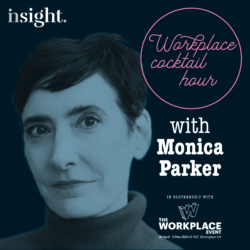 Monica Parker joins Mark Eltringham to share an Old Fashioned while discussing how to find wonder in the everyday, the limits of workplace design, our renewed obsession with productivity, how to achieve flow states in a world of distractions and what it means to be truly happy. There’s not much workplace news around right now as people are still finding their feet after Christmas, so we also explore some lessons we might take from the Post Office scandal about how organisations go wrong and the role of human nature in creating toxic cultures.
Monica Parker joins Mark Eltringham to share an Old Fashioned while discussing how to find wonder in the everyday, the limits of workplace design, our renewed obsession with productivity, how to achieve flow states in a world of distractions and what it means to be truly happy. There’s not much workplace news around right now as people are still finding their feet after Christmas, so we also explore some lessons we might take from the Post Office scandal about how organisations go wrong and the role of human nature in creating toxic cultures. 

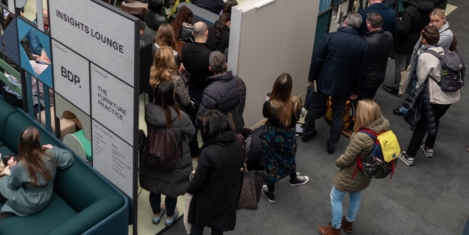
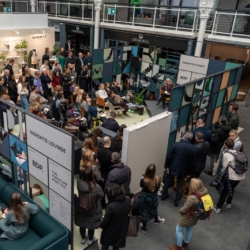



 Nobody seems to be calling it The Great Resignation any more, but two-fifths (40 percent) of the UK workforce are planning to move jobs in 2024, with one in six already beginning their search as staff look to boost their pay packet, according to the latest Candidate Sentiment Survey statistics produced by recruitment firm Robert Half. The survey’s authors claim these statistics demonstrate the resilience of the labour market as more candidates look to capitalise on skills shortages to boost earnings. Those aged 18-34 are more likely to move roles than any other age group (56 percent).
Nobody seems to be calling it The Great Resignation any more, but two-fifths (40 percent) of the UK workforce are planning to move jobs in 2024, with one in six already beginning their search as staff look to boost their pay packet, according to the latest Candidate Sentiment Survey statistics produced by recruitment firm Robert Half. The survey’s authors claim these statistics demonstrate the resilience of the labour market as more candidates look to capitalise on skills shortages to boost earnings. Those aged 18-34 are more likely to move roles than any other age group (56 percent). 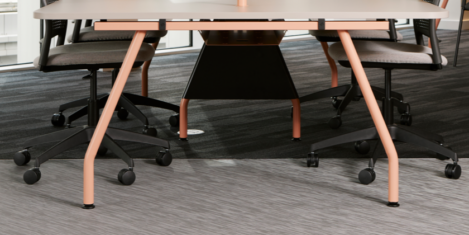
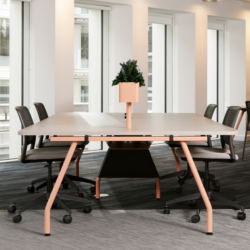 Named for its distinctive kinked leg bracket, KI’s new product, ‘KI-nk’, is the perfect addition to your office space. It’s available as part of a table system or as a bench and desk collection. The KI-nk Table System is available in a range of sizes and 3 different shapes – circular, square, and rectangular – so it’s easier to choose the right style for the area you want to fit out, whether that’s a meeting room, a breakout space, executive office, reception, or a café area. Worktops can be specified with either a square or chamfered edge.
Named for its distinctive kinked leg bracket, KI’s new product, ‘KI-nk’, is the perfect addition to your office space. It’s available as part of a table system or as a bench and desk collection. The KI-nk Table System is available in a range of sizes and 3 different shapes – circular, square, and rectangular – so it’s easier to choose the right style for the area you want to fit out, whether that’s a meeting room, a breakout space, executive office, reception, or a café area. Worktops can be specified with either a square or chamfered edge. 
 A new poll claims that over one quarter (26 percent) of employees in the UK do not trust their CEO to be open and honest, while 24 percent do not trust their senior leadership to do the same. According to the survey of 2,000 employees in the UK from Personio, transparency and employer-employee communication are pivotal to a positive employee experience and trust in the workplace. The research suggests that feeling unheard by leadership could be fuelling employees’ distrust. Over a quarter (28 percent) of employees surveyed say that they are not given a chance to share feedback to leadership on their experiences. Meanwhile, less than half (46 percent) of employees feel that leadership in their organisation actually listens and acts on any feedback when given from staff.
A new poll claims that over one quarter (26 percent) of employees in the UK do not trust their CEO to be open and honest, while 24 percent do not trust their senior leadership to do the same. According to the survey of 2,000 employees in the UK from Personio, transparency and employer-employee communication are pivotal to a positive employee experience and trust in the workplace. The research suggests that feeling unheard by leadership could be fuelling employees’ distrust. Over a quarter (28 percent) of employees surveyed say that they are not given a chance to share feedback to leadership on their experiences. Meanwhile, less than half (46 percent) of employees feel that leadership in their organisation actually listens and acts on any feedback when given from staff. 
 Gossiping at work can have serious negative impacts on your career, according to new research by Durham University Business School and NEOMA Business School. Not only are gossipers frowned upon by other work colleagues, they also become socially excluded in the company, and can experience negative career-related impacts as a consequence of their storytelling.
Gossiping at work can have serious negative impacts on your career, according to new research by Durham University Business School and NEOMA Business School. Not only are gossipers frowned upon by other work colleagues, they also become socially excluded in the company, and can experience negative career-related impacts as a consequence of their storytelling. 







January 16, 2024
Technology is stealing your time in ways you may not realise
by Ruth Ogden, Joanna Witowska and Vanda Cernohorská • Comment, Technology, Wellbeing